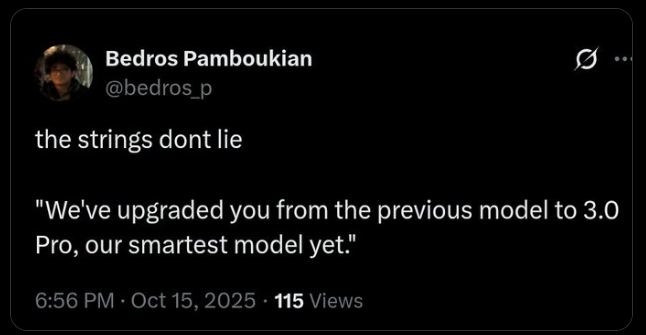Google DeepMind team has recently started pushing the Gemini 3.0 Pro model to some users. Users received an upgrade notification in the Gemini web application, indicating that they have been upgraded from the previous version to "the smartest model to date" 3.0 Pro. This action is seen as a testing phase before the official release, and industry experts expect an official announcement possibly in late October.
From the timeline of the rollout, Google had already initiated an A/B test for the developer community on the Gemini AI Studio platform at the beginning of October, with the internal code identifier for the model being "gemini-beta-3.0-pro". The current stage of the web version rollout is part of a progressive deployment strategy, initially targeting early users to collect feedback before gradually expanding to mobile and enterprise applications.

Technically, Gemini 3.0 Pro introduces the "Deep Think" reasoning architecture based on its predecessor, Gemini 2.5 Pro, aiming to enhance the ability to handle multi-step complex tasks. The model supports multiple input formats such as text, images, audio, and video, and can process real-time camera input, generating front-end code with complete functional modules. According to feedback from early testers, the model can output more than 2000 lines of front-end code, including loading animations, responsive layouts, and other practical features, and it has self-error correction and multi-tool collaboration optimization capabilities.
In terms of application scenarios, the knowledge base of Gemini 3.0 Pro has been updated to October 2025, supporting real-time data processing and multimodal tool orchestration. These capabilities enable it to perform complex operations such as browser interaction, code execution, and third-party API calls, providing a technical foundation for automated workflows and enterprise-level applications. Feedback from the developer community shows that the model performs significantly better than previous versions in front-end development and UI generation.
From a product strategy perspective, Google plans to launch a lightweight "Flash" variant simultaneously. This configuration prioritizes response speed and computational efficiency, targeting mobile devices and edge computing scenarios. This "Pro + Flash" dual-version strategy continues the previous release pattern of the Gemini series, catering to two different needs: high performance and high efficiency.
According to internal leaks, the official release event may be scheduled for October 22. Before that, Google is still working on bug fixes and performance optimization. This update is considered a key step in Google's transition of AI assistants into intelligent agents, which will integrate more deeply with search, Android system, and Workspace office suite.
From the competitive landscape perspective, the release of Gemini 3.0 Pro comes at a time when competition among large AI models is intensifying. With OpenAI's GPT-5 and Anthropic's Claude 4.5 yet to announce clear release plans, Google aims to establish an advantage in areas such as reasoning capabilities and multimodal processing by deploying earlier. However, the actual performance of the model, compatibility with mainstream development frameworks, and stability across different application scenarios still need to be verified through larger-scale user testing.










